Leadership and Personality Research
Section One: Leadership Model
Leadership is commonly identified as an art, yet slightly understood as a science in various literatures. Leadership is both a science and an art (Hughes, Ginnett & Curphy, 2011). To define what “art” is, in the noble words of Gunter Grass, “Art is accusation, expression, passion. Art is a fight to the finish between black charcoal and white paper” (Taberner, 2012). Furthermore, to borrow an interesting description of what “art is not”, from Leo Tolstoy, “Art is not, as the metaphysicians say, the manifestation of some mysterious idea of beauty or God; it is not, as the aesthetical physiologists say, a game in which man lets off his excess of stored-up energy; it is not the expression of man’s emotions by external signs; it is not the production of pleasing objects; and, above all, it is not pleasure; but it is a means of union among men, joining them together in the same feelings, and indispensable for the life and progress toward well-being of individuals and of humanity” (Tolstoy, 2016).
From the above, I arrived to an understanding that leadership seems to be a grey area with various definitions and identifications. I believe leadership is within oneself, it is a process that requests various human skills transformed into mere instinct, which requires a sense of understanding in regards to a particular environment via observation and experimentation as to achieve a certain goal.
Many leadership styles exist, lending itself to being explained through multiple metaphors without a “one size fits all” model. Although it was not an easy task to determine a single metaphor for a personal leadership model, I reflected on my own personal life. Having grown up in a family of farmers, I shall thus compare leadership to farming.
Farming, as defined by the Cambridge English Dictionary, is an act of growing crops and/or keeping animals. A farmer can be thought of as a leader since they attend to the following activities:
- Planting/growing crops and raising/breeding livestock.
- Continuously attending to crops and feeding livestock.
- Finally collecting what the land or livestock have produced.
Given the above activities, a sound farmer would be one that reasons with each and every considerable act of nature as well as promotes a sense of nurture to what they are attempting to achieve.
There are certain acts of nature that cannot be foreseen such as weather conditions. At a time where technology was not around to predict the weather forecast, farmers took upon themselves learning and adapting to the environment, as it was crucial and necessary in constantly maintaining the wellness of the crops and livestock. There are more factors farmers face when considering the art of appropriate farming. Appropriate farming involves the management of three different activities, that are crops, livestock and off-farm enterprises. The decision-making process is relatively difficult as it encompasses the farmer’s use of their knowledge as to come as close as possible to fulfilling the goal they are striving to achieve (Norman, Worman, Siebert, & Modiakgotla, 1995).[1] For example, their ability to manage and allocate crops away from livestock in order to achieve a balanced healthy environment on the farm is necessary, so as not all the crops are being fed on by the livestock and not all the livestock are grazing throughout the farm.
As farmers grow crops with a high-quality yield and cater to nurturing their livestock, similarly, leaders help in growing people and ensure sustainability and profitability to a business. The land and soil are the business culture, the climate is the market, the pests and diseases are then the competition (Tole, 2017).
Leaders sow their values into the lives of others through the expression of attitudes, words and actions. Regardless as to where a leader may exist, be it at work, at home or in a community, the impact that individuals may have on your leadership, your business or organization requires attention as expressions are to be highly regarded by one’s emotional instinct perceived from such interactions (Hale, 2013). Given the outline and understanding of the course this was witnessed by myself in the topic of Emotional Intelligence. I learned that we must partake in being in-tune with our emotions whilst dealing with others in and out of the workplace; attempting to understand the characteristics of whom we are dealing with as well as trying to relate to them to achieve a common goal. This has been evident whilst I recollected my personal observation of farmers attending to their land and livestock with much love, care and attention as to result in better productivity without dialogue. That alone is a magnificent skill to acquire.
Leaders cultivate what they have sown by continuously connecting the dots between their words and actions. This is managed by living out or modelling what matters most to them about others, work, life and faith. Having such a practice put into effect tirelessly, is regarded to be like farming, since farmers weed/water the crops and feed/raise the livestock as to facilitate the full growth of crops as well as maintaining healthy livestock (Hale, 2013).
Finally, leaders harvest what they have sown and cultivated (Hale, 2013). Like farmers, leaders allow themselves to celebrate their goals as well as reflect back on what they have generated or created per se. The act of doing so simply allows the leader to indulge themselves to progress together with their team as they exemplify success to themselves and continue working positively. Reflections, allow a leader to identify where they may have gone wrong and try to approach their harvest in a different manner yet more productive way (Miller, 2012). Similarly, with farming, the farmer would feel a sense of gratification as their goals of maintaining a healthy environment on the farm and the ability to sell their fresh produce as well as having high yields of growth, and a set of well-fed/raised healthy livestock. The farmer’s reflection to their creation would always require attention, hence identifying newer strategies to implement and put into action as to increase productivity and make more use of their resources to progress forward.
The personal leadership model, highly relates to leading by example which is evident in the above section, as I mention exemplifying success in order to progress for both leaders and farmers. I can see it as a vital part of a famers life since each observation I can recall from my past allows me to identify most examples that these farmers could show rather than just point it out in words. I learned actions speak louder than words throughout the life I have lived thus far. This made me understand that not everything is settled by words and sometimes complete silence and the portrayal of an action is more than enough. Therefore, art is a very relevant topic when it comes to leadership due to the understanding of what art is and is not. Leaders are an amalgamation of various skillsets and knowledge. To better phrase what I previously mentioned, I believe farmers are leaders. In regards to my observations to the behaviours of multiple farmers, I can say they have acquired a high level of emotional intelligence, have self-actualized their purpose, and yet are self-aware of their own actions towards tangible hard-to-communicate-with resources (i.e. land, crops and livestock).
Effective leaders, are not always known to be good leaders whereas I believe farmers make good effective leaders due to the way they challenge the process of farming seeking opportunities to change, grow and improve their farms as well as define a model of life by behaving consistently in coordination to their associated goals. More-so the characteristics that are seen in farmers have a tendency of relying on growth and development. For example, their mere ability to encourage their competency in terms of adapting to the know-hows of running a farm as to sustain it, their integrity in acting honestly with the resources given to them as to harmonize the potential of a high level of productivity, their ability to carry on what they do in regards to their direction and the well-being of their resources and finally their vision that allows them to feel rewarded and celebrate their achievement in creating an healthy environment where all resources are put to work together to maximize growth (“Leadership”, 2016).
The leadership styles will vary from one style to another. The majority of styles witnessed in farming are realised to be situational, functional and moral in terms of understanding the importance of all the stages that are required to achieve the final goal. Situational comes into action whilst having to deal with unforeseen changes. Functional relates to the ways of dealing with the available resources such as the land, crops and animals in this scenario. Lastly, the moral approach comes handy whilst the farmers set to better the environment they are within by acting consistently, treating the livestock with care and provisioning a safe environment for their produce (Harvey, 2009).
Section Two: Leadership Personality Assessment
Self-leadership being the ability to lead oneself towards achieving goals. In understanding my purpose as a person, I became willing to work on self-development. My journey started with the growth of a need to depend on myself. Its emergence grew from self-education and the help of various others whom were regarded as leaders. I embraced my liking of leadership from certain role models in my life, starting from my family, later becoming certain icons of the past and present.
I am grateful for having parents who shed the light of intellectualism and wisdom whilst growing up. Many of the lessons they taught me kept me progressing throughout life as well as catering to a greater understanding in identifying my percipience of others I characterised as role models.
In the words of Jack Welch, “Before you are a leader, success is all about growing yourself. When you become a leader, success is all about growing others” (Greenberg, 2012).
Growing oneself is a lifelong process and so is leadership. It requires continuous assessment of skills and qualities, yet it helps in understanding the aims of life and co-ordinates the ability to set goals and realise potential. Personal empowerment and self-education allowed me to find greater self-confidence, self-awareness, self-management and a level of self-motivation to commit to tasks in life to reach a satisfying goal. John F. Kennedy once said: “Leadership and learning are indispensable to each other” (Kennedy, 1963).
As I continued to grow, my path crossed with others. It is inevitable to have at least one friend or person to whom you cannot relate to or try and befriend, regardless of all stages in life. A person will eventually work with someone on a given task. This can be seen either at work, home or within the community. Given the fact that I have moved away from the home I grew up in, many obstacles came my way. I no longer lived in my comfort zone. My surroundings were new, the people within the community were foreign to me, I had to re-calibrate and learn more about the environment I was living in. Therefore, I took on setting more goals that would encourage my participation in this environment. This helped me acquire a sense in furthering my knowledge of teamwork as well as elevate my emotional intellectual instincts in accordance to the surroundings, yet not allow the surroundings change who I am. I remained true to myself, but I visualised a larger set of goals.
Results from the psychometric tests are as follows:
Myer-Briggs/Jung’s Big Five, 16 personalities (ENFP Personality (“The Campaigner”) | 16 Personalities, 2017).
- I am an “ENFP-A” – Appendix B.
- Extraverted, Intuitive, Feeling, Prospecting and Assertive.
This suggests that I possess the personality of a campaigner and has the role of being a diplomat whilst utilizing the strategy of people mastery.
Tony Robbins DISC (Robbin Research International, 2017).
- I have a moderately low Decisive, very high Interactive, high Stabilizing and moderately high Cautious personality – Appendix C.
In accordance to the DISC study, I seem to always build a comfort zone. This suggestively allows me to maintain my stress levels even when I am placed in a fast-moving environment due to my tendency to consciously think about modifying my behaviour.
The Narcissist Personality Inventory (NPI-40 iLearn: MGSM, 2017).
- Score: 15/40
The lower the score the less narcissistic I am, as suggested by Raskin & Hall. This simply states I have an average level of narcissism and is concluded in seven different facets.
To my understanding from this test and the diagram available in Appendix D, various qualities have suggested levels of authority, self-sufficiency, superiority, exhibitionism, exploitation, vanity and entitlement that my personality tends to project. The high level of superiority indicates my senses of being of a high intellect whilst compared to the other tests.
Personal observations in accordance to the above tests:
My suggested personality is “ENFP-A” as per “16 personalities”. The individual traits that were suggested showed a high level of extraversion, a high level of being intuitive, showing feelings, a prospecting character, and moderately assertive. The role as characterised by “16 personalities” suggests I am a diplomatic campaigner who uses the strategy of people mastery.
Results from the interviews:
Interviewee 1 (the male participant), identified my personality to be “ESFJ-A” as per “16 personalities”. The individual traits that were revealed by him showed a high level of extraversion, a moderate level of being observant, showing feelings, judging, and a high level of assertiveness. The role as characterised by “16 personalities” suggests I am a sentinel consul who uses the strategy of people mastery.
More-so, interviewee 1’s completion of the DISC test further acknowledged a moderately low Decisive and very high Interactive personality, whilst concluding a very high Stabilizing and moderately low Cautious personality.
Interviewee 2 (the female participant), identified my personality to be “ISTJ-A” as per “16 personalities”. The individual traits that were revealed by her showed a moderate level of introversion, a high level of being observant, being practical, judging, and assertive. The role as characterised by “16 personalities” suggests I am a sentinel logistician who uses the strategy of confident individualism.
More-so, interviewee 2’s completion of the DISC test revealed a well-balanced result that indicates a high average Decisive, a high average Interactive, a high average Stabilizing and a high average Cautious personality.
Both interviewees were asked to come up with a list of six traits to help identify who I am to them. One listed the traits, whilst the other rated them from 1 – 10 (1 being the lowest, 10 being the highest). The results were fascinating to me, as I would have never actually considered them about myself.
To conclude the results, I have found out that I possess certain characteristics of a natural leader. Given the above suggestions describing my person, I do realise everyone has potential of being a leader in their own way. I believe leading a good life and being a good person shows greatness; those are the first signs of true leadership.
I embrace my strengths and work upon encouraging further strengths to emerge, yet I disregarded any mention of weaknesses. I believe everyone has weaknesses and implying them would discredit the ability of minimising them, yet understanding them may allow a person to bypass them.
As once mentioned by Shusaku Endo: “Every weakness contains within itself a strength” (Scott, 2016). I envision my weaknesses as partially evident within my strengths and in bettering my strengths I can overcome any weakness. Therefore, the suggested strengths I have acquired can be further worked upon to better my being and indulge my sense of leadership.
As for my efforts in bettering myself via personal development, I have set goals to improve the skills I lack in. Traits like social boldness and dominance as stated by the interviewees present in Appendix E will require some work to improve on, yet maintain and improve the rest of the other traits. Whereas from my own assessments, I would have to picture myself in being more assertive and find ways to identify my dominance as I never thought of myself as being someone who is well dominant, rather someone who is very competitive.
References
Cambridge English Dictionary. (2017). Meaning of farming in the Cambridge English Dictionary. www.dictionary.cambridge.org. Retrieved 13 March 2017, from http://dictionary.cambridge.org/dictionary/english/farming
Greenberg, M. (2012). Six Qualities Leaders Need to Be Successful. Psychology Today. Retrieved 15 March 2017, from https://www.psychologytoday.com/blog/the-mindful-self-express/201204/six-qualities-leaders-need-be-successful
Hale, R. (2013). Why Leaders are like Farmers. WellSpirit Consulting Group, Inc. Retrieved 13 March 2017, from http://wellspiritconsulting.com/why-leaders-are-like-famers/
Harvey, T. (2009). Leadership theories, leadership models and leadership principles. www.learn-to-be-a-leader.com. Retrieved 14 March 2017, from http://www.learn-to-be-a-leader.com/leadership-theories.html
Hughes, R., Ginnett, R., & Curphy, G. (2011). Leadership: Enhancing the Lessons of Experience (7th ed., p. 5). McGraw-Hill Irwin.
Kennedy, J. (1963). John F. Kennedy Speeches – John F. Kennedy Presidential Library & Museum. www.jfklibrary.org. Retrieved 15 March 2017, from https://www.jfklibrary.org/Research/Research-Aids/JFK-Speeches/Dallas-TX-Trade-Mart-Undelivered_19631122.aspx
Leadership. (2016). www.thepeopleindairy.org.au. Retrieved 14 March 2017, from http://www.thepeopleindairy.org.au/working-together/leadership.htm
Macquarie Graduate School of Management (MGSM). (2017). iLearn: NPI-40 Narcissism Personal Inventory. ilearn.mq.edu.au. Retrieved 15 March 2017, from http://ilearn.mq.edu.au/mod/quiz/view.php?id=3829882
Miller, P. (2012). ‘Self-reflection: the key to effective leadership’. Today’s Manager, Dec 2011 – Jan 2012. Retrieved from https://works.bepress.com/peter_miller/133/
Norman, D., Worman, F., Siebert, J., & Modiakgotla, E. (1995). The farming systems approach to development and appropriate technology generation (1st ed., p. 33). Rome: Food and Agriculture Organization of the United Nations.
Robbins Research International. (2017). DISC Profile: Free Online Personality Strengths Test – Tony Robbins. Tony Robbins. Retrieved 15 March 2017, from https://www.tonyrobbins.com/disc/
Scott, K. (2016). What is Your Biggest Weakness? – Vistage Florida. Vistage Florida. Retrieved 15 March 2017, from http://florida.vistage.com/2016/11/30/what-is-your-biggest-weakness/
Taberner, S. (2012). Cambridge Companion to Günter Grass (1st ed., p. 167). Cambridge: ProQuest LLC.
Tole, J. (2017). Why leadership is very much like farming. LinkedIn – Pulse. Retrieved 13 March 2017, from https://www.linkedin.com/pulse/why-leadership-very-much-like-farming-jonathan-tole
Tolstoy, L. (2016). What is art? (1st ed.). Bloomsbury Academic.
Appendices
Appendix A:
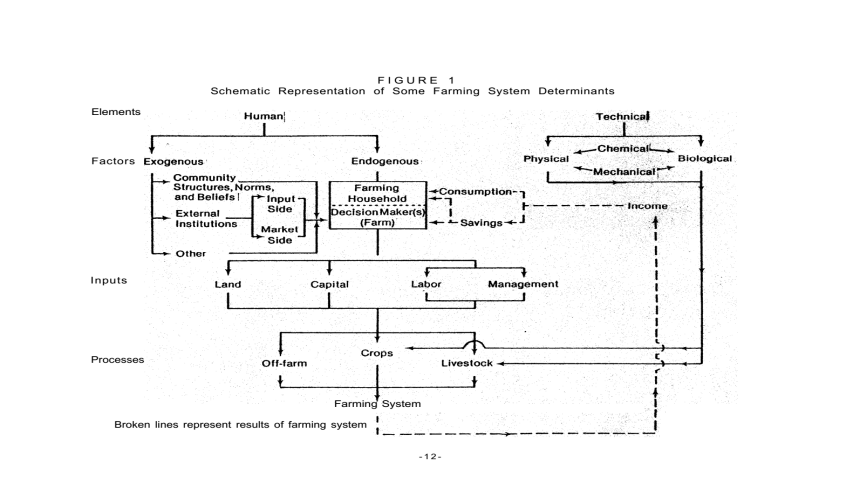
Appendix B:
16 Personalities:
- Personality type: “The Campaigner” (ENFP-A)
- Individual traits:
- Extraverted – 61%,
- Intuitive – 68%,
- Feeling – 64%,
- Prospecting – 53%,
- Assertive – 63%.
- Role: Diplomat
- Strategy: People Mastery
Summary:
- An extraverted mind that prefers groups activities, gets energized by social interaction and tends to be more enthusiastic, yet easily excited than introverts.
- A very intuitive individual who is very imaginative, open-minded and curious. Someone that prefers novelty over stability and focuses on hidden meanings as well as future possibilities.
- A naturally sensitive and emotionally expressive individual who tends to be more empathic and focuses on social harmony/cooperation.
- An assertive individual who is self-assured, even tempered and resistant to stress. Can refuse worrying too much and tends to not push themselves too hard when it comes to achieving goals as they believe goals will naturally come to them.
Appendix C:
DISC:
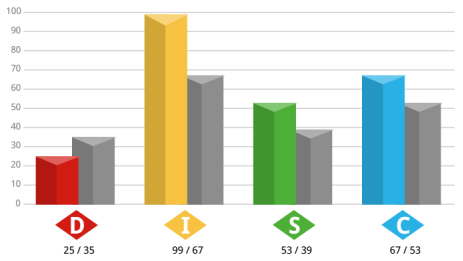
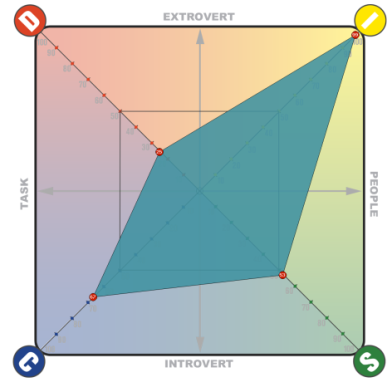
Strengths:
- I have a large knowledge-base and a continuing appetite to learn more.
- I have the tendency to be friendly and easy-going whilst interacting with others.
- I possess the ability to focus on building my own skills and talents as well as assist others on building their own.
- I am modest rather than egocentric, yet can become more assertive when necessary.
- I have a desire to become the best that I can be, or an expert in a specific area.
- I acquired the ability to self-manage.
Appendix D:
Question 1
Two statements. Which best applies to you?
Select one:
a. I am much like everybody else.
b. I am an extraordinary person.
Question 2
Two statements. Which best applies to you?
Select one:
a. I am more capable than other people.
b. There is a lot that I can learn from other people.
Question 3
Two statements. Which best applies to you?
Select one:
a. I get upset when people don’t notice how I look when I go out in public.
b. I don’t mind blending into the crowd when I go out in public.
Question 4
Two statements. Which best applies to you?
Select one:
a. I wish somebody would someday write my biography.
b. I don’t like people to pry into my life for any reason.
Question 5
Two statements. Which best applies to you?
Select one:
a. I am a born leader.
b. Leadership is a quality that takes a long time to develop.
Question 6
Two statements. Which best applies to you?
Select one:
a. People sometimes believe what I tell them.
b. I can make anybody believe anything I want them to.
Question 7
Two statements. Which best applies to you?
Select one:
a. I am going to be a great person.
b. I hope I am going to be successful.
Question 8
Two statements. Which best applies to you?
Select one:
a. I would prefer to be a leader.
b. It makes little difference to me whether I am a leader or not.
Question 9
Two statements. Which best applies to you?
Select one:
a. Being an authority doesn’t mean that much to me.
b. People always seem to recognize my authority.
Question 10
Two statements. Which best applies to you?
Select one:
a. I can live my life in any way I want to.
b. People can’t always live their lives in terms of what they want.
Question 11
Two statements. Which best applies to you?
Select one:
a. I really like to be the centre of attention.
b. It makes me uncomfortable to be the centre of attention.
Question 12
Two statements. Which best applies to you?
Select one:
a. I like to look at myself in the mirror.
b. I am not particularly interested in looking at myself in the mirror.
Question 13
Two statements. Which best applies to you?
Select one:
a. I don’t care about new fads and fashions.
b. I like to start new fads and fashions.
Question 14
Two statements. Which best applies to you?
Select one:
a. I have a strong will to power.
b. Power f or its own sake doesn’t interest me.
Question 15
Two statements. Which best applies to you?
Select one:
a. Compliments embarrass me.
b. I like to be complimented.
Question 16
Two statements. Which best applies to you?
Select one:
a. I will never be satisfied until I get all that I deserve.
b. I take my satisfactions as they come.
Question 17
Two statements. Which best applies to you?
Select one:
a. I expect a great deal from other people.
b. I like to do things f or other people.
Question 18
Two statements. Which best applies to you?
Select one:
a. Sometimes I tell good stories.
b. Everybody likes to hear my stories.
Question 19
Two statements. Which best applies to you?
Select one:
a. I sometimes depend on people to get things done.
b. I rarely depend on anyone else to get things done
Question 20
Two statements. Which best applies to you?
Select one:
a. I always know what I am doing.
b. Sometimes I am not sure of what I am doing.
Question 21
Two statements. Which best applies to you?
Select one:
a. I try not to be a show off.
b. I will usually show off if I get the chance.
Question 22
Two statements. Which best applies to you?
Select one:
a. My body is nothing special.
b. I like to look at my body.
Question 23
Two statements. Which best applies to you?
Select one:
a. I just want to be reasonably happy.
b. I want to amount to something in the eyes of the world.
Question 24
Two statements. Which best applies to you?
Select one:
a. If I feel competent, I am willing to take responsibility for making decisions.
b. I like to take responsibility for making decisions.
Question 25
Two statements. Which best applies to you?
Select one:
a. I can read people like a book.
b. People are sometimes hard to understand.
Question 26
Two statements. Which best applies to you?
Select one:
a. I don’t particularly like to show off my body.
b. I like to show off my body.
Question 27
Two statements. Which best applies to you?
Select one:
a. I insist upon getting the respect that is due me.
b. I usually get the respect that I deserve.
Question 28
Two statements. Which best applies to you?
Select one:
a. I find it easy to manipulate people.
b. I don’t like it when I find myself manipulating people.
Question 29
Two statements. Which best applies to you?
Select one:
a. I like to have authority over other people.
b. I don’t mind following orders.
Question 30
Two statements. Which best applies to you?
Select one:
a. I am assertive.
b. I wish I were more assertive.
Question 31
Two statements. Which best applies to you?
Select one:
a. I am not sure if I would make a good leader.
b. I see myself as a good leader.
Question 32
Two statements. Which best applies to you?
Select one:
a. I am no better or worse than most people.
b. I think I am a special person.
Question 33
Two statements. Which best applies to you?
Select one:
a. I will be a success.
b. I am not too concerned about success.
Question 34
Two statements. Which best applies to you?
Select one:
a. I prefer to blend in with the crowd.
b. I like to be the centre of attention.
Question 35
Two statements. Which best applies to you?
Select one:
a. I can usually talk my way out of anything.
b. I try to accept the consequences of my behaviour.
Question 36
Two statements. Which best applies to you?
Select one:
a. The thought of ruling the world frightens the hell out of me.
b. If I ruled the world it would be a better place.
Question 37
Two statements. Which best applies to you?
Select one:
a. When people compliment me I sometimes get embarrassed.
b. I know that I am good because everybody keeps telling me so.
Question 38
Two statements. Which best applies to you?
Select one:
a. I would do almost anything on a dare.
b. I tend to be a fairly cautious person.
Question 39
Two statements. Which best applies to you?
Select one:
a. Modesty doesn’t become me.
b. I am essentially a modest person.
Question 40
Two statements. Which best applies to you?
Select one:
a. I have a natural talent for influencing people.
b. I am not good at influencing people.
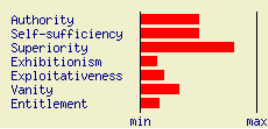
Appendix E:
Interviewee 1’s responses:
“16 Personalities”:
- Personality type: “The Consul” (ESFJ-A)
- Individual traits:
- Extraverted – 85%,
- Observant – 58%,
- Feeling – 57%,
- Judging – 54%,
- Assertive – 88%.
- Role: Sentinel
- Strategy: People Mastery
“DISC”:
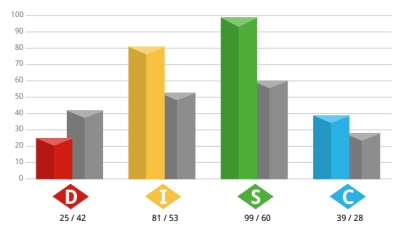
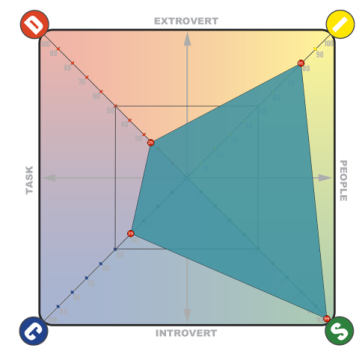
Interviewee 2’s responses:
“16 Personalities”:
- Personality type: “The Logistician” (ISTJ-A)
- Individual traits:
- Introverted – 59%,
- Observant – 72%,
- Thinking – 78%,
- Judging – 75%,
- Assertive – 77%.
- Role: Sentinel
- Strategy: Confident Individualism
“DISC”:
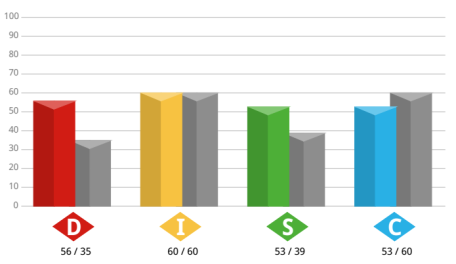
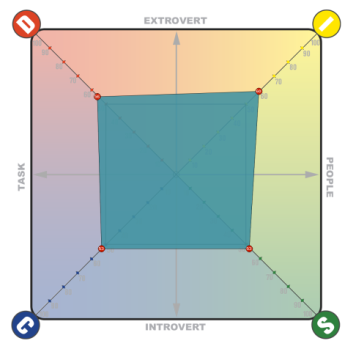
Interview Questions & Answers:
Interviewee 2, May you please select 6 traits and state why you believe I have these traits?
- Emotional Stability
- You are not easily frustrated as you keep your stress levels pretty low and show a how mature you are by tolerating things even when they upset you.
- Tough Mindedness
- You are my go-to person when I seek advice for situations that require practical or logical thinking, and you always respond with a degree of realistic certainty.
- Social Boldness
- You are very spontaneous, as it does not take you long to come to a decision and you are ready to take the risks. Whilst being out and about with you, you tend to maintain a level of high emotional control around those you do not know.
- Enthusiastic
- You are open to change, given that fact you allow yourself to endure many changes in your surroundings and you help aspire people to never stay in one place in life, rather proceed to whatever may come next. You are also very open minded and generally happy in your daily life at work and out of work.
- Dominant
- You tend to decide on be-half of others and you seem to persuade others easier to follow your ideas about life and how it should be lived. You never back down from a challenge.
- Charismatic
- You have a certain level of promoting your own thoughts on others, yet others seem to admire that about you and can easily grasp what you are saying to the point that it helps them embrace changes for personal rewards.
Interviewee 1, May you please rank the traits interviewee 2 stated? From 1 – 10, (1 being the least evident, and 10 being the most evident).
- Emotional Stability
- 8
- Tough Mindedness
- 8
- Social Boldness
- 5
- Enthusiastic
- 7
- Dominant
- 6
- Charismatic
- 7
Personal summary of the interview:
- Emotional stability
- Rating: 8/10
- I tolerate frustration and stress very well. I possess a well-adjusted psychological maturity whilst dealing with anything I face in life.
- Tough mindedness
- Rating: 8/10
- I am practical, logical and tend to be very straight-forward and realistic.
- Social boldness
- Rating: 5/10
- I enjoy being spontaneous and ready to take risks. Happy to respond to others and possess a high level of emotional stamina.
- Enthusiastic
- Rating: 7/10
- I am very open to change and show a high level of optimism.
- Dominant
- Rating: 6/10
- I am well-decisive, very competitive and highly assertive when I promote my thinking style.
- Charismatic
- Rating: 7/10
- I allow others to relate well to my personal visions/goals and let others identify their goals in relation to personal rewards.
[1] Appendix A: Figure 1 – Schematic Representations of Some Farming System Determinants.